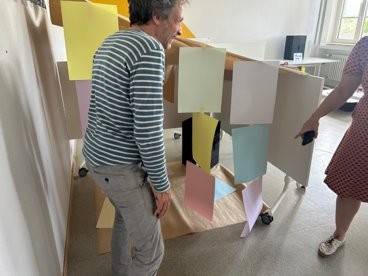
How space shapes learning: insights from the “Raum wirkt” (“space has an impact”) workshop with Michael Fink at the UpSkill
On May 15, 2025, educators and trainers from across Luxembourg, France, and Germany came together for the very first UPSKILL – Trainer Innovation Day. Among the many inspiring sessions, one workshop stood out for its impact and depth: “Raum wirkt” (space has an impact), led by Michael Fink (www.michafink.de), educator and author from Berlin.
The workshop invited participants to explore the often-overlooked yet powerful role of physical space in education. Grounded in psychological theory and supported by current research, Fink kicked off the session by explaining how learning environments can influence motivation, engagement, and the quality of educational experiences.
But this was far from a passive lecture. Participants began by experiencing a conventional classroom setup—rigid rows of chairs, front-facing orientation, and minimal opportunity for interaction. The physical discomfort and limitations of this layout led to immediate and meaningful reflection: How can we expect learners to thrive in spaces that stifle connection and creativity?
The turning point came with the introduction of modular F.use furniture, developed by IFEN, Luxembourg’s national institute for teacher training. In small groups, participants were tasked with designing their own ideal learning environments—spaces that were flexible, collaborative, and ergonomic. The results ranged from open zones for exploration to focused quiet corners and discussion-friendly arrangements, each tailored to different learning needs and teaching styles.
The workshop ended with a reflective discussion on how to bring these spatial concepts into everyday teaching, even with limited resources.
The key takeaway? Through experience, participants learned that spaces are never neutral. Intentional design can empower learners, foster inclusivity, and transform how we teach and learn. Thanks to Michael Fink and the F.use team, “Raum wirkt” left participants not just with new ideas, but with real, practical inspiration for reimagining tomorrow’s classrooms.
Author: Sarah Monfils